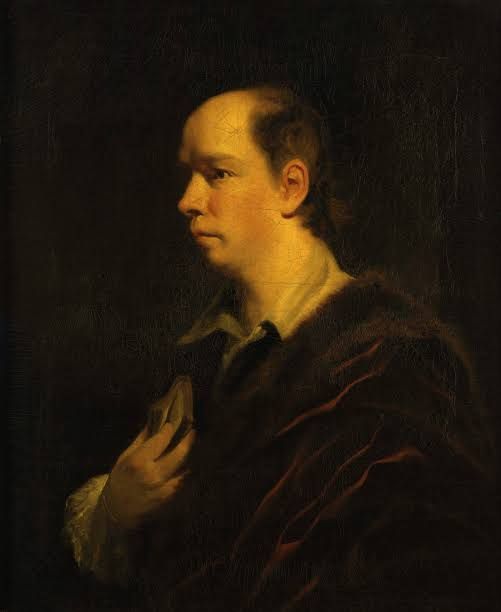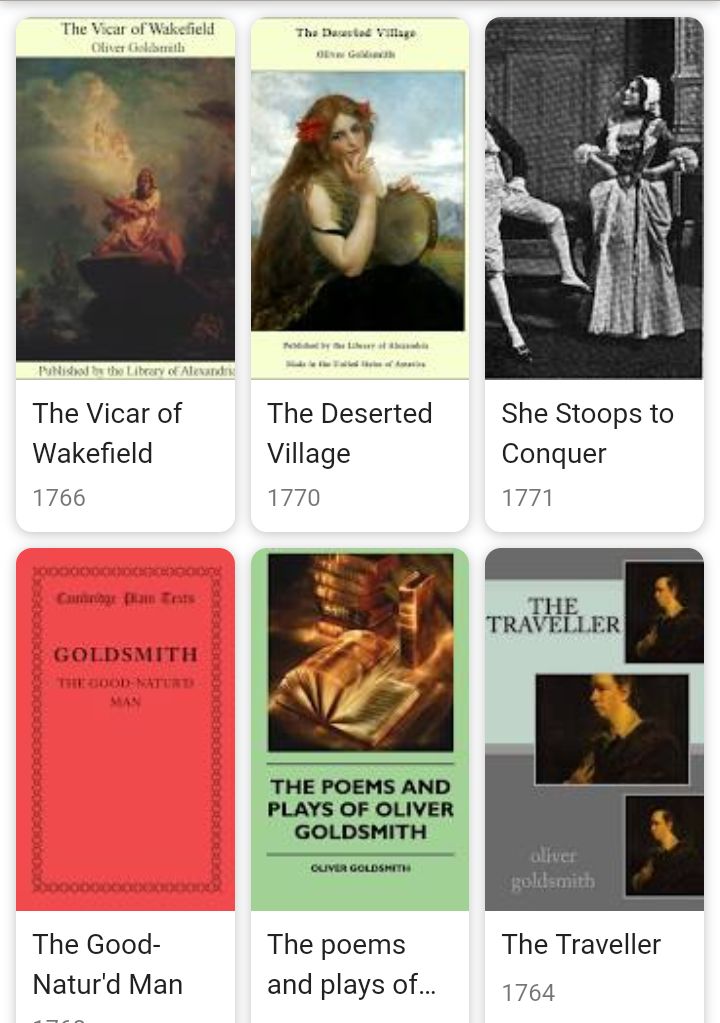Oliver Goldsmith
Sep 04, 2019 • 36 views
As another typical example of the transition poet we take Goldsmith, whose work was produced a full generation after that of Thomson.

His Life
Much of Goldsmith's early life is obscure and our knowledge of it rests upon his own unsupported and hardly reliable evidence. He was probably born at Pallas, a small village in County Longford, in Ireland, and he was the son of the poor but admirable curate of the village. His father, the village, and various local features are duly registered, and unduly idealized, in the poem The Deserted Village. In 1744 Goldsmith proceeded to Trinity College, Dublin: graduated, after some misadventures; and then tried various careers in turn-law, medicine, and playing the flute--at various places, including Dublin, Edinburgh, Leyden, Venice, and Padua. At the last-mentioned place he graduated, according to his own account, as a doctor, and claimed title as such. In truth, a settled career was beyond Goldsmith's capacity. He had all the amiable vices of the stage Irishman: he was shiftless and improvident, but generous and humane; unstable and pitifully puerile in mind, but with bright, piercing flashes of humour and insight. During his years of wandering he roved over Europe, playing the flute for a living; then in 1756 he returned to England, poor, unknown, but undaunted.
Then followed desperate attempts at making a living. In succession he was apothecary's assistant, printer's reader, usher in a school, and finally (the last refuge of the literary down-at-heels) publisher's hack and a denizen of Grub Street. In time, however, by their sheer merit, his writings drew upon him the regard of famous persons, including Dr Johnson and Charles James Fox, the eminent politician. Once recognition came, it came with a rush: money and praise poured in; but his feckless habits kept him poor, and he drifted about in mean London lodgings till his death in 1774. It was said that he brought his doom upon himself by over-use of a patent medicine. He left debts for two thousand pounds. During his latter years he was a member of Johnson's famous club, where his artless ways-his bickerings, witticisms, and infinite vanity- were the cause of the mingled amusement, admiration, and contempt of his fellow-members.
His Works

His Poetry
Though his poetical production is not large, it is notable. His first poem The Traveller (1764), deals with his wanderings through Europe. The poem, about four hundred lines in length, is written in the heroic couplet, and is a series of descriptions and criticisms of the places and peoples of which he had experience. It contains descriptive passages of considerable beauty phrased in simple language, and the couplet is melodious and polished. The poem has his characteristic charm and grace, and reveals a clear perception of the sufferings of the poor, where "laws grind the poor, and rich men make the laws." His only other poem of any length is The Deserted Village (1770). In this poem, as he deals with the memories of his youth, the pathetic note is more freely expressed. His natural description have charm and genuine feeling; but his remedies for the agricultural depression of Ireland are innocently empty of the slightest practical value.
Goldsmith's miscellaneous poems are important, for they include some of his characteristic humorous and pathetic writing. The ballad called The Hermit is done in the sentimental fashion, the witty Elegy on the Death of a Mad Dog is suggestive of Swift without Swift's savage barb, and the fine lines beginning "When lovely woman stoops to folly" are among the best he ever wrote.
His Drama
Goldsmith wrote two prose comedies, both of which rank high among their class. The first, called The Good-natur'd Man (1768), is not so good as the second, She Stoops to Conquer (1773). Each, but especially the latter, is endowed with an ingenious and lively plot, a cast of excellent characters, and a vivacious and delightful style. Based on the Restoration comedy, they lack the Restoration grossness. Yet second play had an immense popularity, and even yet it is something staged.
His Prose
The prose is of astonishing range and volume. Among his works of fiction we find The Citizen of the World (1759), a series of imaginary letters from a Chinaman, whose comments on English society are both simple and shrewd. This series was contributed to The Public Ledger, a popular magazine. He wrote many other essays in the manner of Addison, almost as well done as those of Addison. His other important work of fiction is his novel The Vicar of Wakefield (1766), which is in the first rank of the eighteenth century novels. The plot of the novel is simple, though sometimes inconsistent, the characters are human and attractive, and the book has all the Goldsmith qualities of humour and pathos.
Goldsmith produced a great mass of hack-work, most of which is worthless as historical and scientific fact, but all of which is enlightened with the grace of his style and personality. Some of these works are An Inquiry into the Present State of Polite Learning in Europe (1759), his first published book; The History of England (1711); and An History of Earth and Animated Nature, a kind of text-book on natural history, which was published posthumously.
